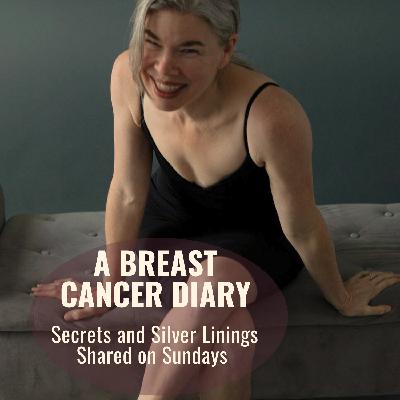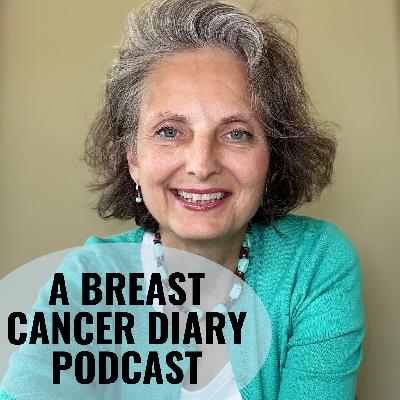Yoga for Breast Cancer with Nanette Labastida
Description
My colleague and friend Nanette has been leading yoga for breast cancer survivors for the past few years in her community of Austin Texas, even as she's navigated the tough journey of recurrent metastatic disease in her bones. I think you'll love her spirit as she shares her story...
Link to yoga4cancer: https://yoga4cancer.com/
Transcript:
Today's guest is Nanette Labastida. She's in Austin, Texas, and she and I have been ambassadors together for Stand Tall AFC over the years. She is a realtor by trade, and her passion is yoga, which we'll talk about at the end of the interview. But I want to start out by asking Nanette about her background, diagnosis, and current, uh, treatment plans. Welcome Nanette.
Hi, I am so excited to be here and chat with you. So yeah my history, my background diagnosis, I was originally diagnosed in 2010. I was 42, um, with breast cancer and it, it was--back then I didn't really pay that much attention to the words-- but I do know that it was ER/PR positive and HER2 negative. And I had chemo, like four rounds of chemo, no radiation. Um, and I had a mastectomy with implants, you know, with, uh, expanders and then implants. And I did tamoxifen for four years. and then in 2019 I explanted to flat. And so that's when I joined that community. It wasn't necessarily through any. um, implant illness Um, it was more like discomfort and never feeling like myself and knowing that at some point they'd need to be changed out and I'd rather not. I had the ability to do it timing wise and insurance wise--zero regrets. And then in 2022, um, I was diagnosed with, uh, stage four metastatic breast cancer. Um, so it was a recurrence, with mets to few spots in my bones, rib pelvis, and a couple on my spine. I think, um, a collarbone lymph node here, which is really the thing that got me into the oncologist. Thank goodness. And pleural effusion around my lungs. Uh oh. And then I started, uh, treatment at that time I was actually qualified for a, a clinical trial. My doctors did some research immediately and just based on like all the factors of my previous treatment and the type of cancer, all the stuff I, I entered this trial called the Serena--I might not remember the exact name of the trial, but the trial was a blind trial in which I was taking (a CDK4/6) Ibrance, taking two other pills. One was. Anastrozole. The other pill was a new drug called "SERD," or a placebo.
So I would take both of them not knowing if I was getting which med I was getting. So I was getting treatment, I just didn't know which one.
Okay. And it turned out in the end. Now, you just recently found out, uh, that you were on the blind arm of the trial, which means you were only taking a CDK4/6 inhibitor.
It turns out I was not taking the SERD, the new trial drug, which was the blinded. So I was taking anastrozole, so I was on what I'd have been on if I wasn't on the trial, like the standard is like almost everybody or you know, a lot of people, they just do the, the CDK4/6 inhibitor and the AI and that's what I ended up being on for three years, almost three years. I didn't get the trial drug, which I've heard that it might be out later this year--a SERD on the market--an oral SERD. It's, it's, I think you had someone recently talking about fluvestrant and that's a SERD.
Um, so it's kind of less, less quality of life and, and they all work a little differently anyway...
For the sake of listeners who don't know what a SERD is, um, I personally got it mixed up with SERM, which is very similar. So there's selective estrogen receptor modulator. Or a SERD is the newer drug, which is a selective estrogen receptor disruptor. I believe those are the words.
Degrader.
Degrader, okay. Thank you. So it's, it's actually degrading the receptor site so that the receptor can't receive estrogen, right? Is that the mechanism?
That's the mechanism, and so it's similar to an AI's to an aromatase inhibitor, but from a different like angle is what I understand.
Well, it's similar to Tamoxifen, I think. Tamoxifen is a SERM where it's a, um, modulator, so it'll, it'll block the receptor so a SERM sits in the receptor and blocks it from receiving any oth other estrogens where a degrader, I think destroys the actual receptor. I love talking about the science.
I, uh, I, I'm learning more and more, you know, especially 'cause I'm sort of such in the depths of it. And I also, like last year, attended the San Antonio Breast Cancer Symposium, um, as a patient advocate. And it, I, I'm so glad I did in this progression because I am so aware now you know, and I can bring them up to my doctor. It was. It I thought it was like too much information, but there's definitely some that like settled.
Awesome. Yeah, me too. I'm, I'm hooked. Yeah. Okay. So tell us about what happened. So you had Mets in 22. Okay. That's when you started the trial right away, when you started with your diagnosis of Mets. So that's three years ago. And then just this year in 2025, you had another. Incident or, um, you know, change in your diagnosis. So tell us what that was like and, and how you understand that now.
Yeah. Um, yeah, this was, um, you know, for people that don't totally know some of the terms, progression is when you've had metastatic cancer, You have it and it's been stable or even no evidence of active activity, cancer activity from your treatment, and then some scan or some results of something shows that it's active again and maybe grown in that area or there's a new area. I had a scan that showed it. Yeah, I had a, um, I had a CT scan, which I was having every three months, and an area in my left pelvis that looked larger, but they, it's where I had mets originally. So they were sort of like hesitant to say, or they couldn't tell, like the CT scan doesn't necessarily show that. It just showed that they were like, they were like, maybe it's just bone degeneration from been affected although, and I had had some like hip pain and I was doing this sort of typical cancer survivor sort of thing of like, "Is this bad? Is it just 'cause I'm working out? Is it 'cause I'm 57???" Is it, you know, you know, or, or is it like alarming? I need to bring it up. And you, you always wanna not bring it up even though you probably should.
And I had gotten to this sort of like. Feeling like, Hmm. It's kind of gotten constant. So, then I got this result then, and that was right before going to YSC, which we'll talk about later.
I had to like go anyway and, um. You know, sort of shelf any worry. And then when I came back, I had my sort of actual doctor's appointment and my tumor marker result, like numbers were up a little bit.
Okay.
I immediately, you know, like you sort of put puzzle pieces together. So I was pretty certain, um, that it, there was progression, but I also had to have a, PET scan scheduled and an MRI of the pelvis. And then I had to delay this appointment, but I also have an appoint, had an appointment with a orthopedic oncologist for X-Ray conversation. I love seeing him. This is my second time and he just gets a little nerdier deeper into the bone structure. Um, I. But he's not my primary oncologist. So yeah, it showed activity in my pelvis, um, in the, uh, I can't remember the scientific term, but it's the back of my pelvis. Um, and there's a hole there. Um, and that's why it hurts.
Oh, wow.
And the rest of the bone is like an eggshell. So I'm a fracture risk. Um, and. I also had to have a biopsy of that, which was it, it was not as bad as I thought, but you know, like that really scared me to go get something from my bone. It's so different than a soft tissue, you know?
Right. A marrow biopsy then?
I think it was, yeah. Yeah. I mean, I, I was, you know, semi like twilight sedated, so it really was like, it was like, oh, you're done? Ok. That's not so bad. Um. And that is to, I, I know there's a lot of tangents on this topic, but there are a lot of tangents in this world, and so it just goes this way. So the reason for the biopsy because of mutations that exist in, um, cancer treatments in cancer. . I think largely as a result of being on treatment, but, you know, can, there's these mutations that can come onto your cancer type that completely change the course of treatment, um, if you have them. Um, and so it's, and that's one thing I truly learned like deeply at San Antonio Breast Cancer Symposium--the, the need for this knowledge to figure out your next treatment and not just go, oh, you have progression. We'll just try another version of the same drugs...
Which is what we used to do.
Um, so, the, while waiting for the results of that, because they're actually still not all the way in, he, my doctor did put me on versions of the other drugs. So I started treatment, I started with, um, another. , CDK four inhibitor, verzenio and then flu tran shots, which is the third that we were talking about--it's a different, different manufacturer and it's in a shot. So it's a different version of this, and different manufacturer. Um, and you know, he's just like, we just wanna get some, you know, some treatment Started. And it was interesting because I had a very difficult time getting Verzenio delivered because of insurance. And this is actually another tangent, but like my insurance is actually quite good and I have, when I meet my deductible, I have a hundred percent medical coverage the rest of the year. So I learned I learned from Ibranz that I can get these drugs classified as a medical benefit. And then they'll be a hundred percent covered instead of a benefit. However, getting everybody to understand that on the same plane is really challenging. For some reason, the insurance actually was the first one to like, approve it for that. But the pharmacy needed lots of information and my doctor's o







